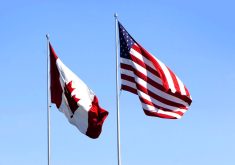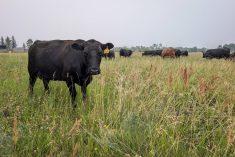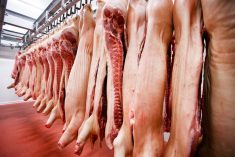Proposition 12 and voluntary country of origin labelling (VCOOL) were among topics raised during federal Ag Minister Lawrence MacAulay’s first ministerial trip to to the U.S. after being appointed to the portfolio last summer.
Earlier this week, MacAulay travelled to Washington to meet with his American counterpart, U.S. Secretary of Agriculture Tom Vilsack, MacAulay’s office said in a Jan. 18 news release. He also met with other officials and agri-food industry members.
“During the meeting, Minister MacAulay raised proposed changes in voluntary “Product of USA” labelling regulations for meat and livestock and California’s Proposition 12,” the release said. “The Minister reaffirmed Canada’s concerns that these rules have the potential to restrict trade and disrupt supply chains.”
Read Also

JBS profit falls amid still-challenging US market environment
JBS, the world’s largest meat company, reported a net profit fall in the third quarter in spite of a rise in global net sales amid a still-challenging beef market environment in the U.S., according to an earnings statement on Thursday.
VCOOL and California’s Proposition 12, often called ‘Prop 12’, have been sources of concern in Canada.
Prop 12, which took full effect at the start of the year, imposes animal welfare regulations on certain meat and animal products sold in the state of California, including imported products.
The hog industry in particular is concerned that, given its integration with the U.S. industry, this will have a chilling effect on pork and live hog exports. The Canadian Pork Council has likened Prop 12 and other similar state regulations to non-tariff trade barriers and has insisted the Canadian government speak out about them. The actual effects of the rule are still unknown.
The sector has also asked the government to take a stand against proposed VCOOL regulations.
In early 2023, the Biden administration proposed rules that would require any meat, poultry or eggs labelled as a U.S. product to be derived from animals raised and slaughtered in the country, not just processed there, as current rules allow. Canadian meat producers fear this will hamper exports to the U.S.
MacAulay met with representatives from the National Cattlemen’s Beef Association and the Canadian Cattle Association to “discuss reducing trade barriers and the important integrated nature of our beef supply chains,” the release said.
MacAulay’s office said he and Vilsack also discussed the importance of sustainable agriculture.
“Canada and the U.S. are working together to accelerate global agricultural innovation on climate change through increased research and development,” the release said. “This includes efforts to identify innovative tools to support decision making, monitoring and measurement of enhanced sustainability and resiliency in agricultural landscapes.”
—Geralyn Wichers is associate digital editor of AgCanada. She writes from southeast Manitoba.















